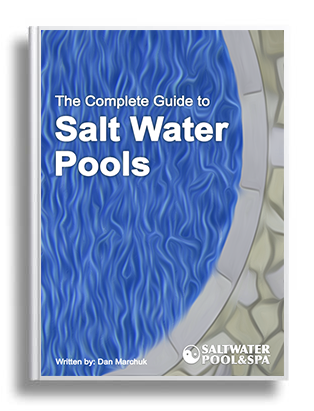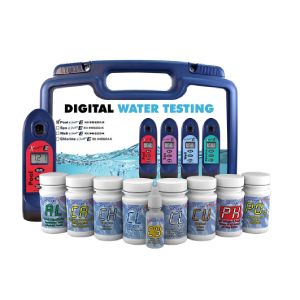- Salt Water Pool and Spa
- Salt Water Pool FAQs
- What is Chlorine?
What is Chlorine?
What is chlorine and how does it work to keep you pool safe to swim in? It's something that most of us take for granted but without the production or use of chlorine we wouldn't be able to enjoy a refreshing swim in one of the millions of pools around the world. In addition to keeping swimming pools sanitary, chlorine helps keep our drinking water safe so to say the least it's a very important part of our world today.

This very useful element belongs to a group of 5 elements called halogens which is made up of chlorine, fluorine, bromine, iodine and astatine. The word halogen is derived from the Greek roots Hal (Salt) and Gen (To produce). All of these chemicals produce salt with similar properties and the most common is sodium chloride (NaCl) or salt.
The Complete Guide to Salt Water Pool MaintenanceEverything you need to know to maintain your salt water pool and keep it running smoothly all season. |
|
How Chlorine Keeps Swimming Pools Clean
In a salt system the salt water is used to produce chlorine through a process called electrolysis. The currents of electricity are passed through the plates as the salt water passes through the system, resulting in the chlorine (Cl) and sodium (Na) separating. The separated free chlorine acts to keep the pool safety and this is the basic process used in salt water systems that creates low levels of natural occurring chlorine to sanitize swimming pools.
Chlorine kills bacteria and other microorganisms through a basic chemical reaction. The main chemicals produced are hypochlorous acid and hypochlorite ions. These chemicals attack and destroy harmful cells and leave them in an oxidized and harmless state.This process continues until the molecules are broken down into single atoms or chloramines. Sunlight and other natural processes then remove the chloramines, which means the chlorine levels have to be maintained.
The process is most effective when the pH of the swimming pool water is between 7 and 8; 7.4 is the ideal pH. Water temperature also plays a role in the effectiveness of chlorine. A higher water temperature will require increased levels of chlorine to remove the harmful bacteria and a lower temperature will require less.
Digital Pool Water Test KitIf you click on this link and make a purchase, we may earn a commission. |
What is Chlorine and is it Unhealthy or Dangerous?
Chlorine can be found in numerous forms and is used in many different applications. It can be very hazardous in liquid or gas form but it is very rare you would find it in this form. The most common form that a swimming pool owner would encounter is in tablet form. Pure tablets are hazardous and should be handled with caution.
There is a very distinct smell when dealing with pure
chlorine that can be unpleasant and even overwhelming. In pool applications it
can cause numerous health issues that include; itchy irritated skin, red or sore eyes, or stuffy nose. A chlorine allergy is often blamed but it’s usually due to a mild
or moderate irritation caused by exposure to the chemical.
There is no doubt that the answer to what is chlorine is that it is a very useful chemical for sanitizing but also potentially dangerous whether it's in pure gas, liquid or solid form. It can cause chemical burns when contacted with bare skin and many other symptoms when inhaled in gas form. Caution should be used when using chlorine or handling it in any form.
Benefits of Chlorine in Swimming Pools
- Effective Disinfection: It's highly effective at killing harmful microorganisms, including bacteria, viruses, and algae, which helps prevent the transmission of waterborne diseases and keeps the pool water safe for swimmers.
- Algae Control: It inhibits the growth of algae, which can cause water discoloration and create slippery surfaces. Proper chlorination helps maintain clear and aesthetically pleasing pool water.
- Oxidation of Organic Matter: It oxidizes organic compounds introduced into the pool by swimmers, such as sweat, urine, and body oils. This oxidation process helps control unpleasant odors and prevents the formation of chloramines, which can cause eye and skin irritation.
- Maintaining Water Clarity: It plays a vital role in maintaining water clarity by eliminating suspended particles and organic matter, ensuring a visually appealing swimming experience.
What is Chlorine FAQs
What is the purpose of chlorine in swimming pools?
What is the purpose of chlorine in swimming pools?
It's added or created to disinfect the water by killing bacteria, viruses, and algae ensuring a safe and healthy swimming environment.
How does chlorine work in pools?
How does chlorine work in pools?
When chlorine is added to pool water, it forms hypochlorous acid, which acts as a powerful sanitizer. Hypochlorous acid destroys microorganisms by disrupting their cell structures, effectively eliminating harmful contaminants.
Can chlorine cause skin and eye irritation?
Can chlorine cause skin and eye irritation?
High chlorine levels or improper chlorine maintenance can cause skin irritation for some individuals. It is important to maintain proper chlorine levels and regularly test and balance the water chemistry to prevent discomfort.
How often should I add chlorine to my pool?
How often should I add chlorine to my pool?
Chlorine levels should be regularly monitored and maintained to ensure consistent disinfection. The frequency of chlorine addition depends on factors such as pool usage, temperature, and environmental conditions but it is typically added on a daily or weekly basis unless you are utilizing a chlorine generator with salt water.
Are there alternatives to chlorine for pool disinfection?
Are there alternatives to chlorine for pool disinfection?
While chlorine is the most commonly used disinfectant for swimming pools there are alternative methods such as salt water systems, UV systems and ozone systems.
Disclaimer
Please use all appropriate and proper safety precautions when attempting projects on this website. All projects are attempted at the reader's own risk.
Salt Water Pool and Spa™ participates in the Amazon Services LLC Associates Program, as an Amazon Associate we may earn a commission from qualifying purchases.

